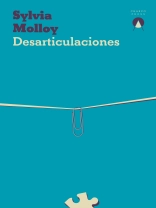¿Cómo mantener una amistad intacta cuando el Alzheimer se va llevando consigo las bases del lenguaje, la memoria y las experiencias compartidas?
La narradora visita casi diariamente a ML., con quien compartió una estrecha amistad y ahora padece mal de Alzheimer. A partir de esos encuentros y los fragmentos de memoria de ML. va construyendo un relato poderosamente conmovedor sobre la desarticulación de una mente que progresivamente va borrando todo de una manera peculiar.Un intento, a través de la escritura, de “hacer durar una relación que continúa pese a la ruina, que subsiste aunque apenas queden palabras”. “¿Cómo dice yo el que no recuerda…?”, se pregunta la narradora frente a esa mujer que le muestra la casa como si la visitara por primera vez o que es incapaz de decir que ha sufrido un mareo, pero puede traducir al inglés perfectamente un mensaje donde se dice que ella ha sufrido un mareo.Pasajes de un pasado y un presente compartidos que se transforman en ficción frente a un olvido que no puede contradecirlos. Un libro que opone al derrumbe una prosa precisa y vital y la sensibilidad única de una de las mejores escritoras latinoamericanas.
In brief, sharply drawn moments, Sylvia Molloy’s Dislocations records the gradual loss of a beloved friend, M.L., a disappearance in ways expected (forgotten names, forgotten moments) and painfully surprising (the reversion to a formal, proper Spanish from their previous shared vernacular). There are occasions of wonder, too—M.L. can no longer find the words to say she is dizzy, but can translate that message from Spanish to English, when it’s passed along by a friend.
This loss holds Molloy’s sense of herself too—the person she is in relation to M.L. fades as her friend’s memory does. But the writer remains: ‘I’m not writing to patch up holes and make people (or myself) think that there’s nothing to see here, but rather to bear witness to unintelligibilities and breaches and silences. That is my continuity, that of the scribe.’
How do you keep a friendship intact, when Alzheimer’s has stolen the common ground of language, memory, and experience, that unites you?
In brief, sharply drawn moments, Sylvia Molloy’s Dislocations records the gradual loss of a beloved friend, M.L., a disappearance in ways expected (forgotten names, forgotten moments) and painfully surprising (the reversion to a formal, proper Spanish from their previous shared vernacular). There are occasions of wonder, too—M.L. can no longer find the words to say she is dizzy, but can translate that message from Spanish to English, when it’s passed along by a friend.
This loss holds Molloy’s sense of herself too—the person she is in relation to M.L. fades as her friend’s memory does. But the writer remains: ‘I’m not writing to patch up holes and make people (or myself) think that there’s nothing to see here, but rather to bear witness to unintelligibilities and breaches and silences. That is my continuity, that of the scribe.’
Sobre el autor
Silvia Molloy (Buenos Aires, 1938) es una novelista, ensayista y destacada crítica literaria de literatura latinoamericana. Es profesora emérita de la cátedra de Humanidades Albert Schweitzer en la Universidad de Nueva York, donde enseñó Literaturas Comparadas y Literatura Latinoamericana. En 2007, también en la Universidad de Nueva York, creó la Maestría en Escritura Creativa en español, la primera en los Estados Unidos. Escribió dos novelas: En común olvido (2002)__ y En breve cárcel (1981); varios volúmenes de relatos cortos, entre ellos Varia imaginación (2003), Citas de lectura (2017), Vivir entre lenguas (2016) y este libro, Desarticulaciones (2010). Entre sus ensayos y publicaciones críticas se encuentran At Face Value: Autobiographical Writing in Spanish America (1991) e Hispanisms and Homosexualities (1998). Ha sido becaria de la Fundación Guggenheim, del National Endowment for the Humanities, del Social Science Research Council, y de la fundación Civitella Ranieri. Actualmente vive en Nueva York.Sylvia Molloy (Buenos Aires, 1938-2022) was a novelist, essayist, and a leading literary critic of Latin American literature. She was Albert Schweitzer Professor of Humanities Emerita at New York University, where she taught Latin American and comparative literatures. In 2007, at New York University, she created the MFA in Creative Writing in Spanish, which was the first programme of its kind in the United States. She was the author of two novels: En común olvido (Shared Oblivion, 2002) and En breve cárcel (Soon Jail, 1981), and had written several books of short prose including: Varia imaginación (Varied Imagination, 2003), Citas de lectura (Reading Dates, 2017), Vivir entre lenguas (Living Between Languages, 2016) and Dislocations , originally entitled Desarticulaciones (2010). Her critical work includes At Face Value: Autobiographical Writing in Spanish America (1991), and Hispanisms and Homosexualities (1998). She was a fellow of the Guggenheim Foundation, the National Endowment for the Humanities, the Social Science Research Council, and the Civitella Ranieri Foundation. Dislocations is her first book of fiction to appear in English.












